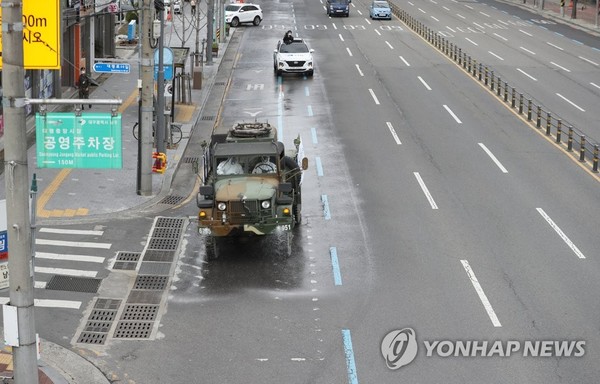The cumulative number of novel coronavirus cases in the southeastern city of Daegu surpassed 1,000 on Thursday, data showed, with the increases likely to continue for a while as more test results of citizens who are followers of the virus-hit Shincheonji religious group are being released.
The Korea Centers for Disease Control and Prevention (KCDC) said a total of 1,766 people were infected with the COVID-19 virus in South Korea as of 4 p.m., up a whopping 505 from a day earlier.

Of the total, 1,132 patients, or 64 percent, are from Daegu, with an additional 422 cases announced on the day.
The spike came as a growing number of followers of the group in the city have tested positive in recent days.
Daegu, a metropolis of 2.4 million people about 300 kilometers southeast of Seoul, has become the biggest cluster of mass infection since the nation's 31st patient was confirmed to be infected with the COVID-19 virus early last week.
The 61-year-old Shincheonji follower reportedly visited a Daegu church four times before and after she felt symptoms of coronavirus infection.
As a result, more than 60 percent of the infected people in Daegu are linked with the religious group.
All 8,269 worshipers of the Daegu Shincheonji church have been subject to comprehensive virus detection tests and self-quarantine. As of Thursday morning, 622 of them have tested positive for the infectious virus, according to quarantine authorities.
The church said nearly 2,000 followers in Daegu have completed tests so far, and the results of the remaining 6,000 will come out over the next few days.
At the same time, Shincheonji is also suspected of being connected with another mass infection occurring in a hospital in Cheongdo, south of Daegu. About 114 patients in the institution have been infected with the coronavirus.
A number of Shincheoji followers attended a funeral for a brother of Shincheonji founder Lee Man-hee held at the hospital on Jan. 31.
Daegu Metropolitan City said the number of coronavirus infections in the city will likely rise further when the additional test results of Shincheonji followers are released.
"The coming seven days will be the tipping point of the COVID-19 epidemic," said Mayor Kwon Young-jin.
Shincheonji, known as Shincheonji Church of Jesus, Temple of the Tabernacle of the Testimony, has been under fire for the rapid spread of the infectious virus.
The church has promised to offer the complete list of its 210,000 followers to quarantine authorities and help them go through virus detection tests.
It said it has asked its followers to place themselves under self-quarantine to prevent further infections, with 1,100 churches and annexed buildings closed.
The South Korean government said that it has secured the complete list of 310,000 Shincheonji followers, including 65,000 initiates, and sent it to provincial governments for thorough preventive measures.
But there are growing concerns over the credibility of the information due to the religion's secretive organization and propagation strategy.
A civic group filed a lawsuit against the founder of the Shincheonji church, saying that he is responsible for allegedly providing false information on the number of its members and facilities and hindering the government-led inspection.
The group claimed that Shincheonji has some 400 undercover offices and churches and refuses to disclose the list of 70,000 initiates and famous figures.
The Shincheonji church claimed that it has not operated a branch in Wuhan, the origin of the COVID-19 virus, since 2018 and that there have been no human exchanges with the epicenter.
But a YouTube channel named Doomsday Office on Wednesday unveiled a recording of a service held at a Shincheonji church in Busan on Feb. 9 that indicates the religious group has concealed information about its overseas networks.
The lecturer in the service, presumed to be the head of one of the religion's 12 "tribes," said it has a branch in Wuhan, China, the origin of the COVID-19 virus. (Yonhap)

